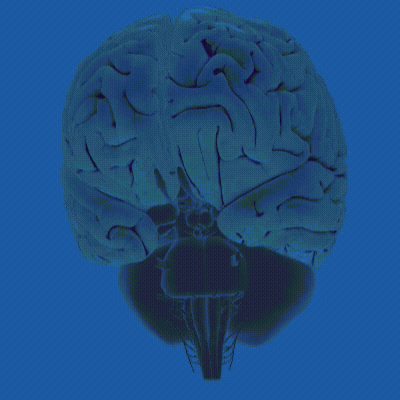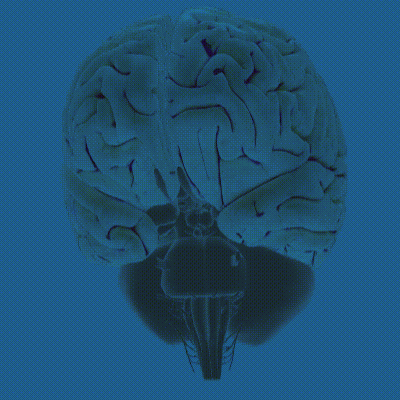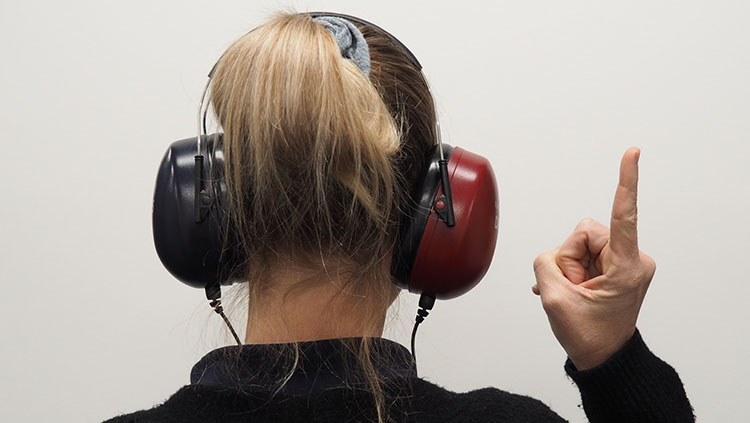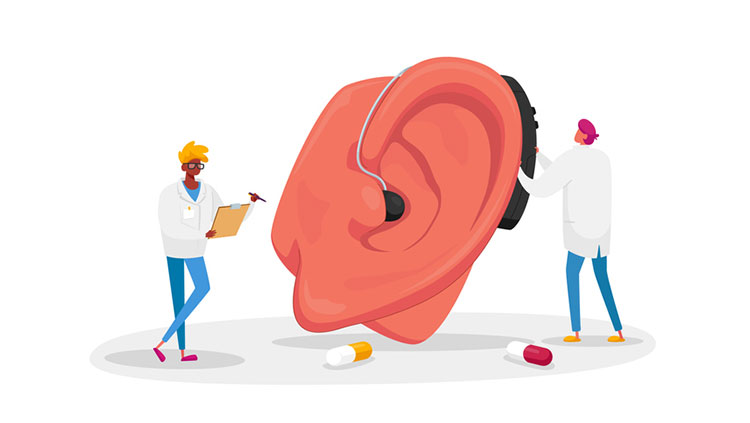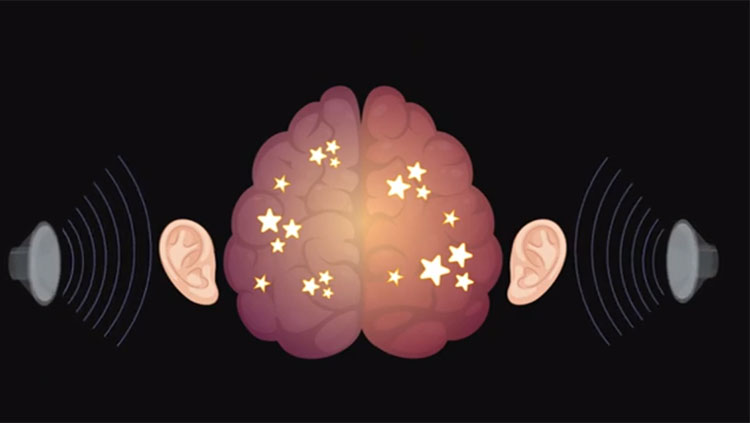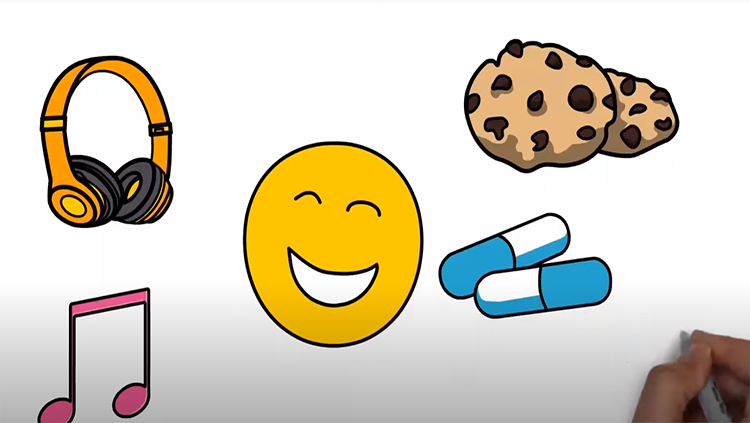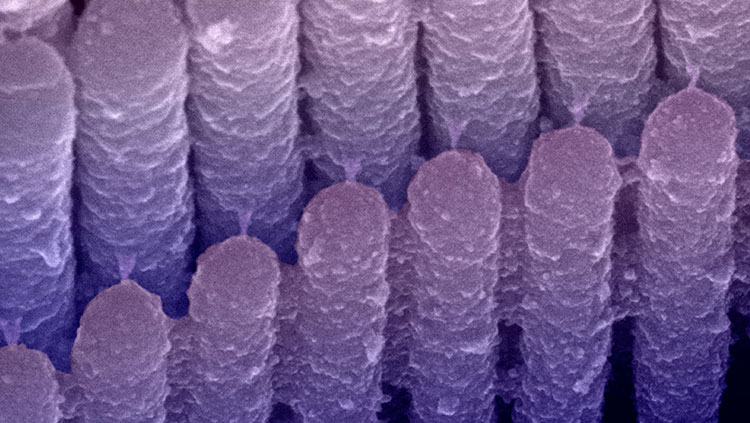Sound Expectations: Mouse Prediction-error Neurons May Offer Insight Into Auditory Hallucinations
- Published10 Jul 2024
- Author Robin Tricoles
- Source BrainFacts/SfN

Our brains constantly make predictions. Musicians know when they’ve hit the wrong note. They expect to hear one sound and instead hear another. But knowing when something sounds wrong isn’t exclusive to musicians — mice share a similar behavior.
David Schneider and his colleagues at New York University found a set of neurons in mice that recognizes when sounds don’t match their expectations. Recognizing when something sounds wrong is key to learning — and it may provide researchers with insight into the development and detection of psychiatric disorders, like schizophrenia.
Located in the auditory cortex, prediction-error neurons fire only when an unexpected sound occurs. “That allows some neurons to pop out and say, ‘Hey, something weird happened,’” says Schneider, assistant professor of neural science at New York University.
For example, if someone is learning to play a musical instrument, recognizing a wrong note is key to mastery and avoiding mistakes in future recitals. “So, the way you minimize errors is every time you detect an error, you change your behavior,” says Schneider, whose study was supported by a grant from the National Institutes of Health.
During a series of experiments in his lab, each mouse heard a particular sound after repeatedly pressing a lever and came to associate the sound with pressing the lever. The researchers then altered the sound. When a mouse subsequently pressed the lever and heard the unexpected sound — or, when a mouse’s movement made no sound at all — its prediction-error neurons fired.
For animals like mice, being aware of the sounds they make is a matter of survival. For instance, footfall attracts attention, making the rodents vulnerable to becoming a meal for hungry predators.
Researchers don’t yet know what mechanisms govern prediction-error neurons’ specialized response, but they do know different parts of the brain and body work together to distinguish expected sounds from unexpected ones.
“Your auditory system can learn something and make a prediction and inform your visual system,” says Aleena Garner, assistant professor of neurobiology at Harvard University. “So, your visual system will expect something because your auditory system has made a prediction.”
In other words, “Our brains make a model of the world, and we use that model to predict what will happen next,” says Garner. This phenomenon is known as predictive coding.
Garner’s research focuses on how we take our internal model of the world, which is made up of memories and experiences, and then transmit it to our sensory systems to modify the way we perceive sensory input.
If your sensory input matches your prediction, they balance each other out, says Garner. If they don't match, then you get an error signal, and it updates your model.
However, Schneider says he thinks “the special sauce” lies in the auditory cortex. Although auditory centers receive other kinds of sensory signals, such as signals about movement, evidence suggests these signals are mixed together in the auditory cortex.
“It (the brain) does a really cool thing,” says Schneider. “It sends a signal from the motor cortex to the muscles, and it sends a copy of that exact same signal over to the auditory cortex. One signal is telling me what I hear,” says Schneider. “At the same time, I'm getting a signal telling me what I'm doing, and the brain is remarkably good at taking simultaneously occurring inputs and learning that they're associated with one another.”
Human Predictive Processing
Whether we’re learning a language or learning to play a musical instrument, we need to be tuned into the sounds we make, says Schneider. “I need to be able to detect when a sound that I made matched what I hoped it would make, but also when it deviates in some way from what I was hoping for,” he says.
For humans, the ability to accurately assess the environment through sensory input is more complex. Researchers are finding evidence that schizophrenia is associated with errors in predictive processing in humans; that is, creating a false internal model of what’s around us in real time. According to the NIH, everyday activities can be difficult for people with schizophrenia. For example, schizophrenia can make it difficult to organize thoughts and speech, and it can trigger delusions, hallucinations, or both.
Predictive processing is “the perfect framework” for understanding how things could go wrong neurologically, says Albert Powers, associate professor of psychiatry at Yale University.
Those things involve delusions and hallucinations, says Powers. Delusions are fixed, false beliefs about the world, and hallucinations involve perceiving things without a corresponding external stimulus. There’s significant evidence that individuals with psychosis have poorer sensory discrimination abilities, according to Powers. In the lab, participants with psychosis tend to report hearing or seeing things others don’t — even after learning these hallucinatory sights and sounds could happen.
“They're over-trusting their expectations more than their incoming sensory evidence,” says Powers.
“In humans with schizophrenia, communication between the motor cortex and the auditory cortex is disrupted, and this can be particularly evident when those subjects are experiencing hallucinations,” writes Schneider in an email.
“So, one could imagine that maybe the motor cortex starts sending signals to the auditory cortex even when a person isn’t talking,” writes Schneider. “The auditory cortex gets that signal, and even though it doesn’t hear anything through the ear, it interprets that input from the motor cortex is speech, which would lead to hallucinations. Now this person can’t distinguish real sounds from those originating from inside their own head.”
Powers cautions that some people who have diagnosable psychotic illnesses, such as schizophrenia, may hallucinate, but so do some people who don’t have a diagnosable mental illness. Recognizing this distinction is important because it can open the door to early treatment of psychiatric disorders and the knowledge to develop treatments to better address the distress and dysfunction that sometimes come with these symptoms.
CONTENT PROVIDED BY
BrainFacts/SfN
References
Audette, N. J., & Schneider, D. M. (2023). Research Articles, Systems/Circuits Stimulus-Specific Prediction Error Neurons in Mouse Auditory Cortex. The Journal of Neuroscience, 43(43), 7119-7129. https://doi.org/10.1523/JNEUROSCI.0512-23.2023
Benrimoh, D., Fisher, V. L., Seabury, R., Sibarium, E., Mourgues, C., Chen, D., & Powers, A. (2024). Evidence for Reduced Sensory Precision and Increased Reliance on Priors in Hallucination-Prone Individuals in a General Population Sample. Schizophrenia bulletin, 50(2), 349–362. https://doi.org/10.1093/schbul/sbad136
Kafadar, E., Fisher, V. L., Quagan, B., Hammer, A., Jaeger, H., Mourgues, C., Thomas, R., Chen, L., Imtiaz, A., Sibarium, E., Negreira, A. M., Sarisik, E., Polisetty, V., Benrimoh, D., Sheldon, A. D., Lim, C., Mathys, C., & Powers, A. R. (2022). Conditioned hallucinations and prior overweighting are state-sensitive markers of hallucination susceptibility. Biological Psychiatry, 92(10), 772–780. https://doi.org/10.1016/j.biopsych.2022.05.007
Rossi-Goldthorpe, R., Silverstein, S. M., Gold, J. M., Schiffman, J., Waltz, J. A., Williams, T. F., Powers, A. R., Woods, S. W., Zinbarg, R. E., Mittal, V. A., Ellman, L. M., Strauss, G. P., Walker, E. F., Levin, J. A., Castiello, S., Kenney, J., & Corlett, P. R. (2024). Different learning aberrations relate to delusion-like beliefs with different contents. Brain : a journal of neurology, awae122. Advance online publication. https://doi.org/10.1093/brain/awae122


